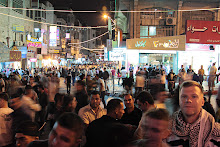First, questions for Miriam Said:
1) Since the peace process stalled and began deteriorating in the mid-1990s, attitudes among politicians and segments of the public on both sides of the Israel/Palestinian divide have hardened. As time goes on and the distance from/to a peaceful settlement grows, has the West-Eastern Divan Orchestra had difficulty with the logistics of practice and performance? That is, I am wondering if the performers are able to get together and practice outside of the yearly meetings in Spain. As a addendum, I'd also be curious to find out what Israeli/Palestinian government or public attitudes toward the project are. It seems ironic that the Orchestra meets and performs so facilely outside the region, but performances in Israel/Palestine are so rare.
2) Related to the mission of the West-Eastern Divan Orchestra, and drawing on the influential work of Edward Said: Particularly among the politically powerful on both sides of the Israel/Palestine dispute, images of the Other have increasingly become ossified over time. While the West-Eastern Divan Orchestra is a compelling project in and of itself, what (if anything) might result politically? That is to say, it is a noble and worthwhile effort to break down the walls between individuals--particularly young people--but the walls exist and continue to grow because of the actions of the powerful. And the politically powerful rely on tropes regarding the Other, tropes that generate support for their political agenda domestically. For example, Netanyahu cannot (publicly) characterize Palestinians as anything other than intransigent intruders, lest he lose support from the Israeli right; Abbas cannot talk productively about Israel without losing support to Hamas. So as a political engagement, I don't know if the project will bear fruit.
My overall impressions of the cultural exchange and dialogue among Israeli and Palestinian youth are unguardedly enthusiastic. I am firmly of the school that it is "better to light a candle than curse the darkness," and the West-Eastern Divan Orchestra project is the exact sort of the interpersonal exchange--among young people--that I think that the Israel/Palestine dispute needs. But my enthusiasm wanes quickly when I recall the reality of the geographic and political divide between the two sides. I despair that a cultural exchange will ever have a significant impact on the entrenched positions of the (politically) powerful, and I wonder about class issues, as well.
To elaborate on this last point, though I have seen news items on individuals, groups, and NGOs that donate monies and instruments to youth in Palestine, by and large, developing the skills needed to play symphony instruments is largely a luxury. Not only are instruments expensive, but playing & practicing demand time and space that most Palestinian youth simply don't have. So the pool from which the West-Eastern Divan Orchestra draws from on the Palestinian side is probably not representative of Palestinians on the whole--I would guess that the Palestinians involved largely come from more affluent (and culturally more Westernized) backgrounds.
Similarly, on the Israeli side, though the higher standard of living and a tradition of musical aptitude (with Western symphony instruments) would lead me to believe that there would be a more representative sample of Israeli youth, I don't see many hard-right families allowing their children to perform in the Orchestra. I can imagine secular and/or leftist families being much more enthusiastic, and therefore I wonder if the political orientations of the participating performers are predisposed to dialogue with Palestinians.
So ultimately, I wonder if the project has that great of an impact. The critical side of me wonders if the youth involved are changing their own outlooks and perceptions (of Other-ness) that much--if they aren't already predisposed towards dialogic exchange, especially as far as music is concerned. And then, once established, I wonder how much the dialogue accomplishes on the wider scale. In other words, does it make a difference beyond the lives of the performers?
Again, I think it is noble and completely worthwhile. But I also am a realist, a pragmatist, and I don't think that the Orchestra is going to change any of the political realities. Actually, if anything, I think that the project makes for good propaganda by extremists on either side, sort of a "Well, of course we don't hate them--look, we let our kids play in an orchestra with them!" thing.
Sunday, April 17, 2011
Subscribe to:
Post Comments (Atom)


I think I agree with what you are saying (if I understood you right, that is :)). I think it is a great project but I don't think that it's doing the job directly, especially that the Israeli's and the Palestinians (or the ARABS) don't do any traveling within each others borders!
ReplyDelete